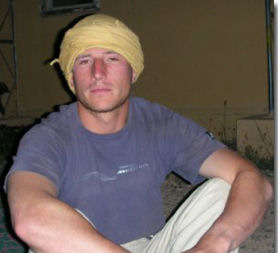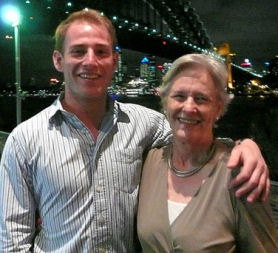Lt Mark Evison death, a grieving mother’s story
Lt Mark Evison’s mother Margaret Evison explains to Channel 4 News that she wants Mark’s story to help British soldiers receive the vital equipment they need to fight in the Afghanistan war.

Lieutenant Mark Evison, 26, died last May as he led his platoon from 1st Battalion Welsh Guards out on a patrol to secure compounds and “dominate” the Haji Alem area of Nad-e-Ali district, Helmand Province, Afghanistan. Channel 4 News has exclusively obtained combat video footage showing the moments leading up to Lt Evison’s death.
Margaret Evison, Mark’s mother wanted Channel 4 News to broadcast the video of his last battle in Afghanistan because she does not want British soldiers serving in the Afghanistan War to suffer the same fate as her son. She said that sharing this very personal thing is “very difficult”, but the reason she is doing it is effectively for the good of others.
I think that if we are sending soldiers out to fight in one of the most difficult and dangerous wars that there has been, then we owe it to them to make sure they have what they need. Margaret Evison
She also wants answers from the Ministry of Defence as to why there was a helicopter delay of 39 minutes when Lt Evison was shot by the Taliban sniper. She says there has not been any explanation as to why there was a helicopter delay by the MoD.
She said: “Well I personally think that if we are sending soldiers out to fight in one of the most difficult and dangerous wars that there has been, maybe since the Second World War, then we owe it to them to make sure they have what they need.
“And if they are injured there needs to be enough kit around to make sure that they are saved if possible. There are cases that come up of soldiers who haven’t got what they needed to make sure that their lives are saved and die as a result. And I think that the government owes it to them, if anything only under the human rights act.”
Channel 4 News has charted the war from patrols in the northern mountains to current bitter fighting, writes Alex ThomsonThe mission since the invasion and occupation almost a decade ago now, has widened and spread beyond all recognition into de facto nation building from the new trunk road connecting the capital Kabul with Kandahar in the south - to giving Afghans the dubious benefits of voting and a bi-cameral western "democratic" model.
Not bad ambition then, for a country built upon tribal fiat and warlord muscle, valley by valley, poppy field by poppy field, alongside hefty interference with money and weapons and know-how from Iran to the west, Pakistan has the east and the former Russian republics to the north: the Great Game continues alive and well.
So down the near decade of war now, Channel 4 News has charted that stark war from the horse-mounted patrols of the British armies in the northern mountains, to the current bitter fighting across the poppy and wheat fields of southern Helmand Province.
The government is in the process of deciding where the axe may fall and the Ministry of Defence is facing cuts of up to 20 per cent. The department is holding a strategic defence review this month to decide how the Armed Forces should be run.
Defence Secretary Dr Liam Fox will make an announcement about cuts in late October to coincide with the Chancellor’s comprehensive spending review. Among the issues he is considering are army numbers, the £20bn renewal of the Trident nuclear deterrent and the £5bn programme for two new aircraft carriers.
CutsCheck: Liam Fox’s leaked letter
Margaret Evison on her motivation to help British soldiers
Mark’s death was a great sadness to a large number of people, as he was loved by many.
It raised many difficult issues. Mark’s diary, written in Afghanistan to 3 days before he died, pointed to shortages in radios, medical kit, men and also water and food. These have all be ratified as factually correct by others. The circumstances surrounding his death and the coroner’s enquiry raised more issues.
Whether Mark would have survived if there had not been a 39 minute delay (acknowledged as such by the coroner) cannot really be ascertained. In a way it is irrelevant to this situation. The long-held ‘golden hour' time frame has been used over several wars as a benchmark time to save men’s lives between injury and hospital.
That length of delay should not be there in Afghanistan anyhow if the ‘golden hour’ was in place, and the tenets of the military covenant were accepted. (Mark did not get o hospital for almost an hour and 25 minutes after he was shot). No explanation for this delay was given by the MOD at the coroner’s inquest, although records were known to exist. It is not clear that there were helicopters available at that time suitable for that patrol base.
Mark ‘bled to death’ (as stated by the pathologist) only 20 kms from a sophisticated hospital base. That seems a clear travesty of the Military Covenant, that mutual obligation between the nation and the Armed Forces that armed forces personnel can expect to be treated fairly and have the support of the nation, society and the government to sustain them while soldiering. The conservative government recently announced plans to enshrine this in law.
Mark arrived back at Selly Oak Hospital in near Birmingham after hours of complex surgery in Afghanistan with his body still operating (albeit with life support) but brain dead. This was the major cause of death, and there was a time factor around this happening.
There were clearly issues over radios in particular for the men fighting on the ground.
It is because of these matters, the importance of them for other soldiers and families, that I have decided to release information about Mark’s death. These things needs further consideration, in my view, and steps taken to improve these situations for others.
Mrs Evison says that Mark’s story is a prime example of why frontline equipment and manpower should not be cut, as British Armed Forces continues to face the Taliban in Afghanistan for a tenth year.
She said: “It’s obviously a very tricky one because the Armed Forces themselves – there are obviously conflicting loyalties – and limited resources and the whole country is going to have to cut. So they have to make decisions about what they can do and what they can’t do.
“But I still think that they need to make sure if they are going to cut helicopters that they’ve got very tough and strong contracts with other countries to make sure that their helicopters can be used.
“So generally I think they owe it to the soldiers to look after them and to make sure they’re equipped adequately. And to make sure that if they are injured, they are dealt with in a way that they should be.”
On the helicopter delay Margaret accepts that her son may have died even if there was an immediate medevac for Mark Evison, but she cannot understand why the MoD has not given her any explanation for why there was a delay.
She said: “Clearly I think it would have been nice if the MoD had shown enough, if you like respect, to go to the trouble, to sort out my questions and in the end the questions of the inquest, which were to find out the circumstances in which Mark died.
Perhaps someone will tell me one day. It would be nice if they did. If they don’t know, then fine. Even if they said ‘well we don’t know’ or it was human error, I would be very forgiving if it was human error. Margaret Evison
“So the aim of the inquest has not been achieved really, so satisfactorily and at the end the Coroner actually said to the MoD ‘if the information about the reasons for the delay became available, perhaps you could make it available to Mrs Evison’. And my lawyers wrote to them afterwards and said ‘well now it’s over, perhaps you’d tell us what happened?’
“And they, in my view rather unkindly, said ‘we’re not going to because we don’t have to’. So I was quite upset about that too. I think that in the end the MoD were Mark’s masters and he gave his life for his soldiers and for the army and I think they owed it to him.”
She continued: “Perhaps someone will tell me one day. It would be nice if they did. If they don’t know, then fine. Even if they said ‘well we don’t know’ or it was human error, I would be very forgiving if it was human error, but if it was that there weren’t enough helicopters and a soldier was left bleeding to death 20 kilometres from a hospital in Afghanistan, then I think it needed looking at.”
Afghanistan war video: see how my son died
Exclusive: the mother of British officer Mark Evison killed by the Taliban in Afghanistan tells Channel 4 News she wants the world to see the video showing the moments leading up to her son’s death.
Rupert Thorneloe tribute to Mark Evison
Exclusive: Channel 4 News publishes a letter written to Lt Evison’s mother by his commanding officer, Lt Col Rupert Thorneloe, who himself became the highest ranking soldier to die in the Afghanistan war.
Evison and medics linked by blood
Exclusive: Lt Mark Evison underwent hours of emergency surgery at Camp Bastion on 9 May 2009, receiving 42 pints of blood. Written by his nurses, Channel 4 News publishes the Bastion hospital diaries.
Afghanistan war diaries reveal Evison’s kit warnings
Just 28 days before Lt Mark Evison died he wrote a diary in which he vented frustrations and concerns over equipment shortages in the Afghanistan War. In his own words, this is Mark’s story.

Mark Evison Foundation
Margaret Evison has set up a charity in his memory which sets out to help young people realise their goals.
The Mark Evison Foundation aims to promote the personal, mental and physical development of young people, particularly those who have less opportunity.
Margaret hopes that the foundation will help the youths to gain more confidence, courage and self-reliance.
She says to obtain the funding the young people need to show some sort of initiative, evidence of a “can-do” attitude and a willingness to develop. She wants them to be caring and understand the importance of mutual support, collaboration and teamwork.
The charity funds young people who want to pursue a goal by way of grants up to £5,000. Selected schools are also given awards of up to £500.
Margaret Evison says that during Mark’s life he had the opportunity to pursue personal challenges at many levels, including expeditions like running 500 miles across the Pyrenees and two weeks trekking on the glaciers of Norway.
Two recent benefactors of the Mark Evison Foundation were two 16-year-old boys who wanted to complete the UK’s four peaks challenge.
She says he greatly enjoyed planning and carrying out these journeys and that such experiences gave him confidence and leadership skills which were invaluable when he served in the Welsh Guards.
Two recent benefactors of the Mark Evison Foundation were two 16-year-old boys who wanted to complete the UK’s four peaks challenge. They successfully conquered the four biggest mountains in Britain, Ben Nevis, Scafell Pike, Snowdon and Slieve Donard.
The boys, Tomos and Luke travelled over 1,500 miles using 33 public transport connections with their dog Anvil. Not only did they reach their goal of completing the Four Peaks in under 96 hours, but they raised nearly £2,000 for the Mark Evison Foundation.